Shockwave BBS- by Andrew Murray You probably saw the title and thought of Adobe Shockwave, or as they were known once, Macromedia Shockwave. Long before that, there was Shockwave BBS. That was mine. It had nothing to do with the Adobe product. In fact, Shockwave BBS came before the Web was even popular, and the Web is what killed it off in the end. 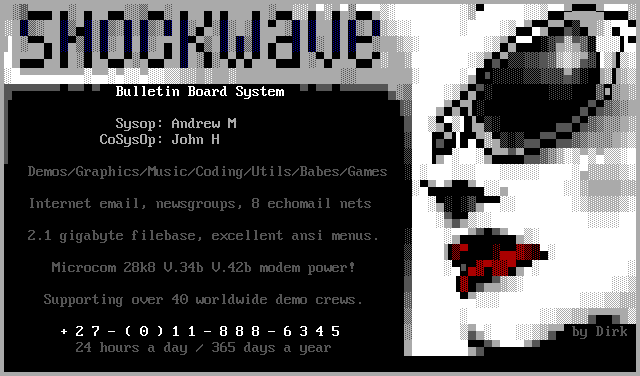
The story of Shockwave BBSIt's not a particularly interesting story to most, but I felt like it needed telling just so that there is some record of it. It all started when I was 13 years old. I'd been playing with my first computer for two years - a 12MHz 286 with 1MB RAM. I enjoyed playing games and learning to program in BASIC, but I'd always felt something was missing. One day, I saw an advert in a PC magazine for a Bulletin Board System, or BBS. It said I could connect my computer to another computer somewhere across town, through my phone line! This brought so many possibilities! Maybe there could even be a girl on the other end who also liked computers? I had to know. I called the number on the advert and someone answered with a weird long beeping sound. I hung up, called the other number on the advert, and a woman explained that I'd need to start by buying a modem. I shelled out over a year's pocket-money and ordered a 2400 baud modem from a friend's mother, who worked at a company that could get these kind of things. You must remember, maybe a thousand people in the country had ever seen a modem back then. You couldn't exactly walk into a corner café at 9pm and pick one up. A month or so later, it arrived. This modem maxed out at 240cps, or by today's measures, 0.2KB/s. It didn't have an error correction protocol, so the slightest amount of crackling on the phone line would cause a stream of random ASCII characters to appear in the transfer, totally messing up anything that was being downloaded, or worse, disconnecting the call altogether. Computers didn't come with software to get online, so you had to figure it out yourself. Luckily, once you'd battled through the basics and connected to your first BBS, you could page the System Operator, or SysOp, who was invariably a friendly enthusiast who would help you through the rest. Sometimes they'd just break in and chat if they could see you were struggling along. I'll admit I caused a bit of trouble at first, being a teenager and all, but quickly learned some online etiquette and made a few friends. I was shown the ropes and pointed to Roblist, the definitive list of South African BBS's. I started logging into every BBS I could find, creating an account on each one, playing their games, annoying the SysOps, downloading their files. All was well with the world... until... My parents opened their phone bill the next month. "Andrew, we need to talk." That was that. I'd had a taste of this amazing secret underworld, and now it was all over. The Telkom phone bill I'd run up was enough to feed an average South African family for a year, and it would take the rest of my life to pay it off with my monthly allowance. I missed the online world and its people so much. What if there was some way I could get back to it without having to pay for outgoing phone calls? I considered phreaking - the illegal route. But what if... what if I could somehow get everyone else to phone me instead? I spent the next month configuring RemoteAccess, the software required to start my own BBS. It's the kind of entrepreneurial spirit that every kid has, I think. At the age of 13 you don't ever stop for a second to think that something might not work. My school friend Peter was great at art, so I asked him to design all the screen layouts. He could only use basic ASCII text characters, 16 colours, and 80 columns by 25 rows. In return, he'd get to be a Co-SysOp. He used a DOS program called TheDraw, and it was quite amazing what he accomplished with such limitations: 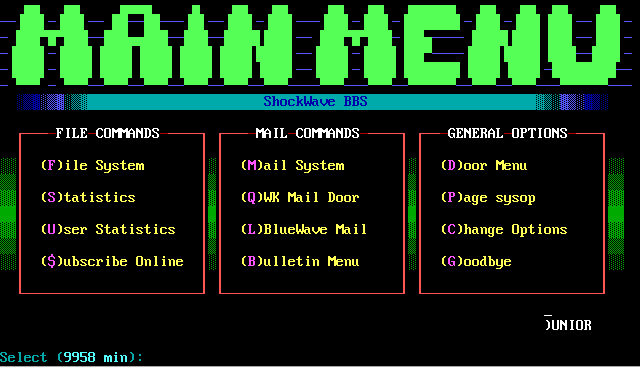
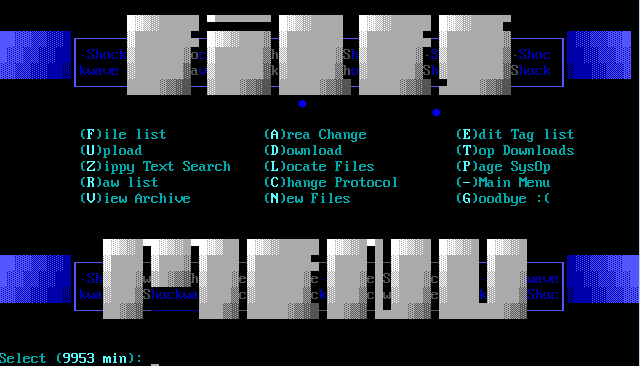
Since our household only had one telephone line, the BBS would need to run after hours, 9:30pm - 6am. I submitted my details to Robslist, and on 1 July 1994, I started the modem answering software. Calls started coming through immediately. It was fantastic. The few hobbyists out there seemed quite hungry to try new BBS's. I was addicted. Instead of doing my homework I'd watch people as they dialed in, browsed the BBS, sent mail to other members, played games. I'd stay up late every night chatting to my users, and was always trying to make the experience better in any way I could. This included joining a few local mail networks. They were similar to Internet newsgroups, except that they weren't connected to the Internet, and they weren't real-time. You could send a mail to anyone just by typing in their first and last name, and then later that night, each BBS would connect to a hub, which in turn might connect to another, more major hub. They'd each drop off all new mail they'd accumulated that day and pick up any responses - similar to how a real post office works. If you were lucky, your mail might arrive 1 or 2 days after you'd sent it. Within months Shockwave ran into two problems. Firstly, the 340MB hard drive became full. I'd already hacked together a batch file to run each night and delete all log files and old mails and users, but this was no longer cutting it. Secondly, my users were starting to complain that the telephone line was always busy. I needed more money, and I needed more phone line. It was time to start charging. Having no business sense at all, I just made up a figure that seemed like a lot to me - R80 ($12) for a year's unlimited access. Non-subscribers would be restricted to 20 minutes per day. I applied for my own dedicated telephone line, upgraded to a 28.8k modem, and reopened as a 24-hour subscription BBS, much to the relief of my parents who had been constantly bombarded with phone calls from modems, whose users hadn't read the "after 9:30" detail. The subscriptions brought in just enough money to keep the hardware upgraded and pay the phone bill. Another guy from school, Dave, ran a major mail hub BBS called The Lair that he'd somehow set up with Internet email. I paid him a monthly fee in return for a subdomain that piggy-backed off his system. Email absolutely blew my mind. Now I could send a private mail anywhere in the world, and get a reply within 3 days. There were all sorts of crazy things that ran on top of email. Like FTP Over Email - I'm not joking. You could send an email like "LIST ftp.example.org/pub/incoming", and 3 days later, you'd get back a list of files. Then you could send another email, "GET /pub/incoming/some-file.zip" and 3 days later, assuming the files were still there and you hadn't missed a space, you'd get maybe 50 e-mails full of UUencoded text, and you'd spend a few hours sticking the e-mails together and trimming out their headers so that you could decode and extract the file inside. One of Shockwave's first users, John, introduced me to a movement called the demo scene. It was a mashup of art and programming. Programming enthusiasts would form groups and code a demo, cool graphical effects with synthesized music. No animation or recording was allowed - your program had to render everything dynamically in real-time using mathematics and hardware effects. Demos were exhibited at competitions, on huge screens where the audience would vote for the favourite. It was a huge hit in Scandinavia, and there was a niche following in South Africa. I emailed all the most famous demo groups and asked if I could be their official South African distribution site. A number of them wrote back and said Yes - including the world famous Future Crew. Demos soon became Shockwave's specialty: 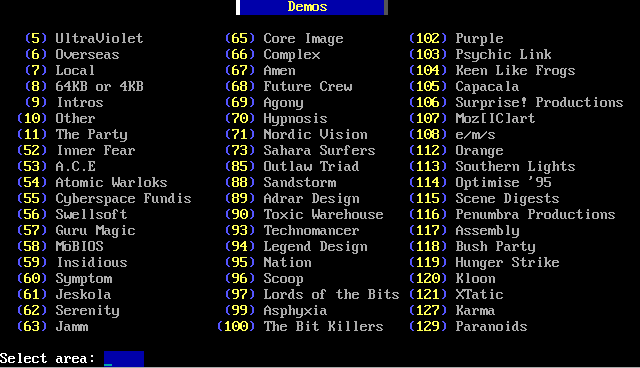
One day, I decided to throw a small party at my house to meet some users face-to-face and screen a few demos. About 30 people came around and had some fun, in a weird geeky sort of way. A week later, strange things started happening to the BBS. People whose names I didn't recognize were accessing subscription-only features, like e-mail. Then, while I was watching, I saw someone drop to DOS and start going through the files on my hard drive! Turns out that while everyone was at the party, one of my users' friends had snuck into my bedroom, logged onto the BBS locally and given himself administrator privileges so that he could hack in later. I still have a few graphs showing the demographics of my users as of December 1996 (excluding those deleted due to inactivity.) 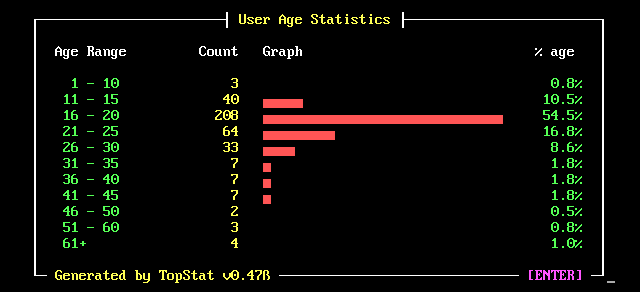

Some of those girls were my sister and her friends messing around. But one of them was a genuine girl user, and I can proudly say that Shockwave BBS acted as a matchmaking site - she hooked up with another of my users for a few months. One day, when I was 16, a user named Andrew who used to often chat to me about programming, logged in. He paged me and said, "Dude, are you interested in a weekend job?" It was at an ISP that had just started up, and they needed technical support staff. Turns out that the guy interviewing me was also a Shockwave user and a fellow SysOp I knew well. The interview was just a formality. The ISP I worked at expanded quickly. Every time they needed new staff, I knew exactly where we could find them: the BBS. All the users there were enthusiastic and technically competent. Unfortunately, this Internet thing became pretty popular that year. The same early adopters who came to BBS's before anyone else knew what a modem was, were on the Internet before anyone else. The BBS message boards dried up, the games went unplayed, the file base became obsolete. My plans for expanding into a multi-node system were no longer necessary. In September, I announced that I'd be shutting down. Not that many people cared. On December 31st 1996, I
refunded the few remaining subscribers, backed up a few core files for The crazy thing is the profound and lasting impact it has had. Some of those online friendships turned into true friendships in the real world. Andrew & John went on to become two of my greatest friends, and 14 years later they both stood beside me as I got married. The ISP I started working at became the start of a long and prosperous career. Had I not started there, I would never have met half of the great people there (or their friends, or their friends...) Looking through my Facebook social network today, 14 years later, its not just that half the people I know can be traced back through a series of events to people on that BBS, but half of the other friendships and business deals that have forged around me, between school friends and work colleagues, may never have happened if it wasn't for this strange little BBS that nobody has ever heard of. This page last updated: 29-06-2011 | Original article (copied with permission)
|